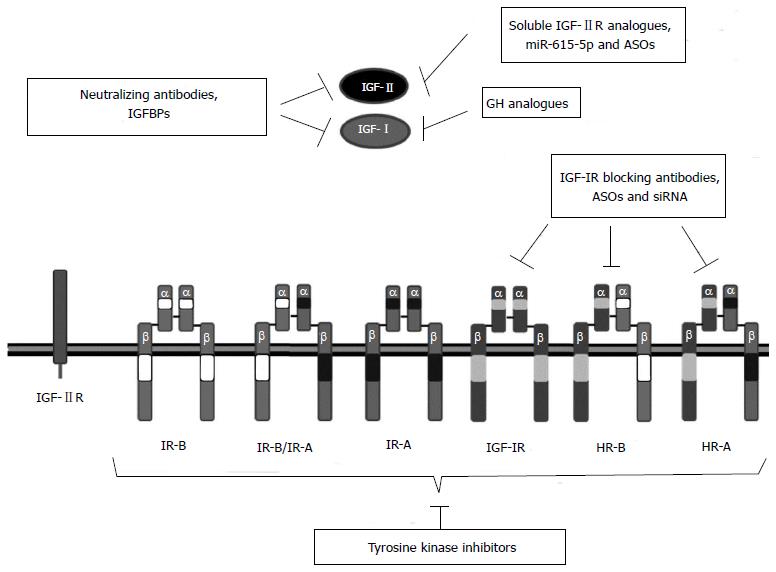Copyright
©2014 Baishideng Publishing Group Inc.
World J Hepatol. Oct 27, 2014; 6(10): 716-737
Published online Oct 27, 2014. doi: 10.4254/wjh.v6.i10.716
Published online Oct 27, 2014. doi: 10.4254/wjh.v6.i10.716
Figure 4 Insulin growth factor targeting strategies in hepatocellular carcinoma treatment.
Different strategies can be used to inhibit insulin growth factor (IGF) signaling. They can be ligand based or receptor based therapies. Ligand based therapies affect signaling through all IGF receptors, but these strategies should not be therapeutic in tumors with activating mutations in IGF-IR receptor or downstream proteins. Growth hormone (GH) analogues reduce IGF-I expression by blocking GH-GHR interaction. Specific ASOs and miR-615-5p decrease IGF-II expression. Soluble forms of IGF-IIR and IGFBPs can decrease IGF-II bioavailability. Ligand directed neutralizing antibodies impede binding to receptors. Receptor based therapies focus mainly on the inhibition of IGF-IR signaling. Antisense oligonucleotides (ASOs) and siRNAs decrease IGF-IR expression and IGF-IR blocking antibodies impede ligand mediated activation. These strategies do not affect IR-A and IR-A/IR-B, which could be crucial in the progression of some hepatocellular carcinoma. Tyrosine kinase inhibitors inhibit insulin receptor (IR)-A, IGF-IR and hybrid receptor autophosphorylation and subsequent activation but commonly they also inhibit IR-B receptor which is essential for the metabolism of normal cells. IGFBPs: IGF high affinity binding proteins.
- Citation: Enguita-Germán M, Fortes P. Targeting the insulin-like growth factor pathway in hepatocellular carcinoma. World J Hepatol 2014; 6(10): 716-737
- URL: https://www.wjgnet.com/1948-5182/full/v6/i10/716.htm
- DOI: https://dx.doi.org/10.4254/wjh.v6.i10.716









